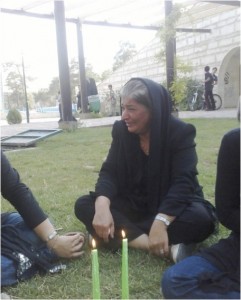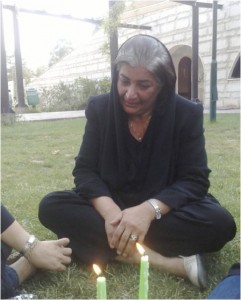Neda’s Mother Holds Solitary Candle Vigil While Her Memorial Service is Violently Attacked
(30 July 2009) Thousands of people gathered to commemorate the fortieth day of Neda Agha Soltan’s killing and to mourn all other recent deaths at Behesht Zahra Cemetery today. The peaceful gathering was attacked violently by Special Guards and plain-clothes Basij agents, the International Campaign for Human Rights in Iran said. Security forces also prevented Mir Hussein Moussavi and Mehdi Karrubi from participating in the memorial services.
Neda’s mother, Hajer Rostami Motlagh, who had previously announced her intention to go to her daughter’s grave for the memorial service, announced last night that for unspecified reasons she and her family had cancelled their plan to go to Behesht Zahra.
The Campaign has learned that Neda’s mother, who goes to the site of her shooting every Thursday to light a candle in memorial, did not go there either today. Instead, she went to a park near her house and lit candles in her memory (see pictures).
During the past few weeks, families of the dead who are receiving their bodies, some many weeks after the killings without any explanation, have attempted to arrange memorial services. Many had planned to join Neda’s fortieth day anniversary to combine these memorial services. Moussavi and Karrubi had applied for a permit to hold funeral services, without any chanting or speeches, but the Interior Ministry refused to issue a permit. The two reformist politicians had announced they would participate in Neda’s memorial service at Behest Zahra.
According to eyewitness accounts reported to the Campaign, security and police forces surrounded and occupied the grounds of Behesht Zahra in large numbers hours before the participants arrived there. Using threats and force, the government forces attempted to turn back the crowds converging on Behesht Zahra.
At 2 p.m. Tehran time, security forces detained Jaafar Panahi, a well-known filmmaker, his wife and daughter, and three older women who were accompanying them. As the crowds increased, thousands of people managed to arrive at section 257 of Behesht Zahra, where Neda and other recently killed protestors are buried. Around 7 p.m. Basij and plain-clothes agents violently attacked the mourners, using tear gas and beating the crowds with batons.
“It is not acceptable to kill people’s children, and then without accountability, use every possible means to pressure the victims’ families into silence and even deprive them of holding a simple funeral service for their loved ones,” said Hadi Ghaemi, the Campaign’s spokesperson.
“The participation of large crowds in Behesht Zahra showed that the families and general public are insistent on exercising their very basic and fundamental rights. The authorities, instead of expanding on their criminal actions by relying on more violence, should hear the call of the people for accountability,” he added.
Noting the extensive human rights violations and criminal acts by government and government-supported forces, the Campaign continues to call on the United Nations to send a special committee of human rights experts headed by the Secretary General to Iran to demand an immediate end to violence and investigate the fate of hundreds of disappeared, detained, and killed people during recent events.








